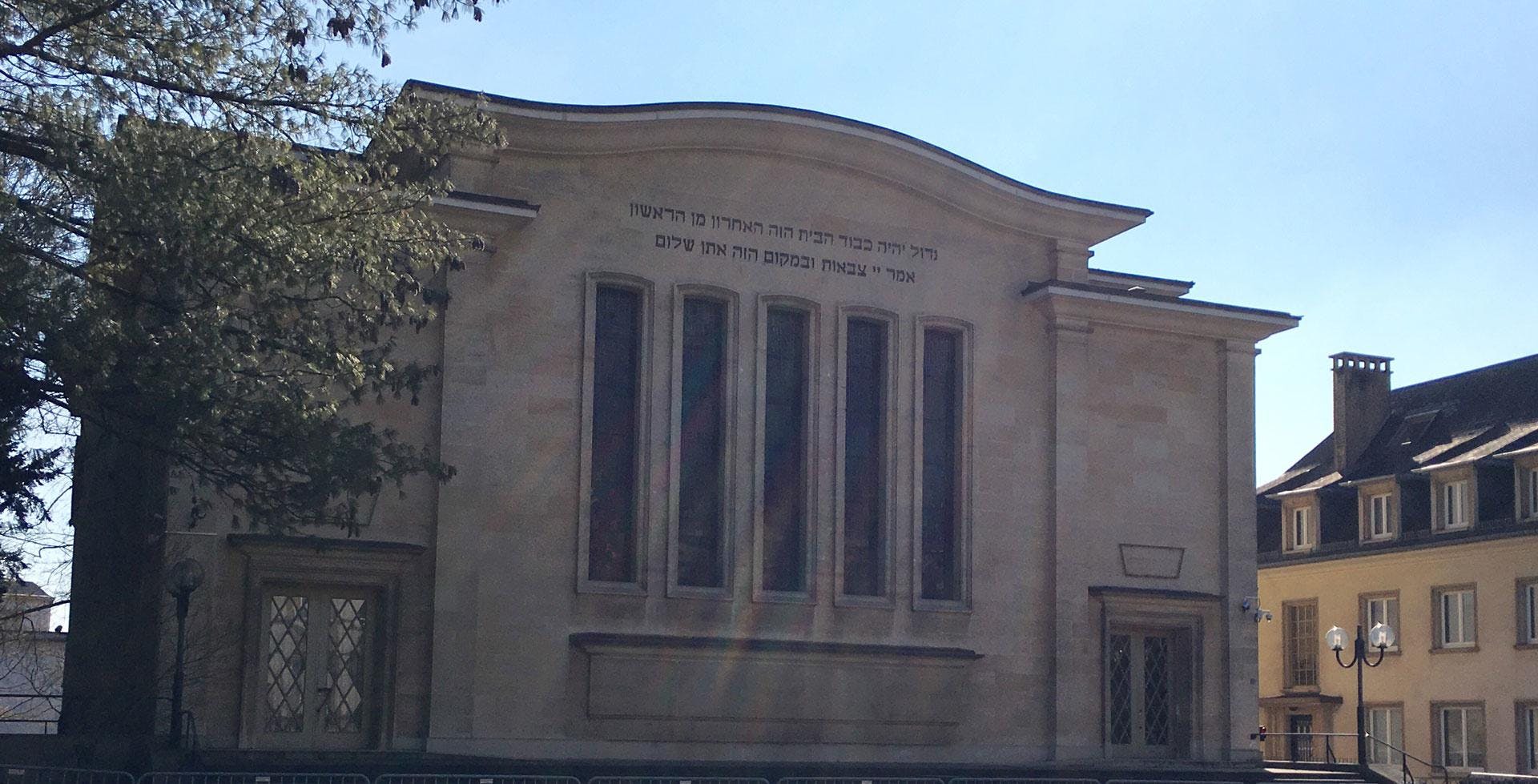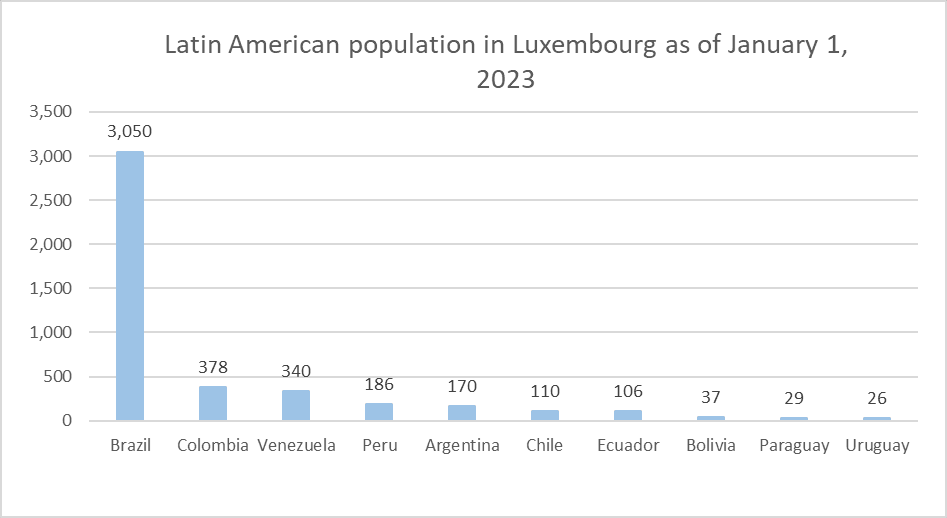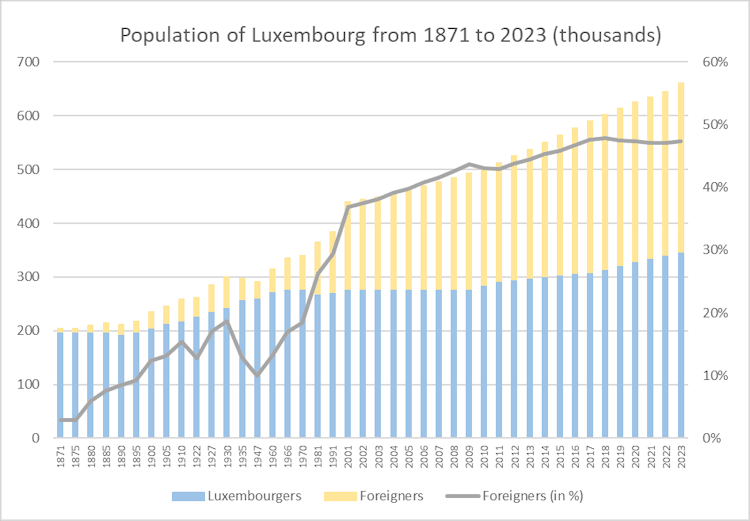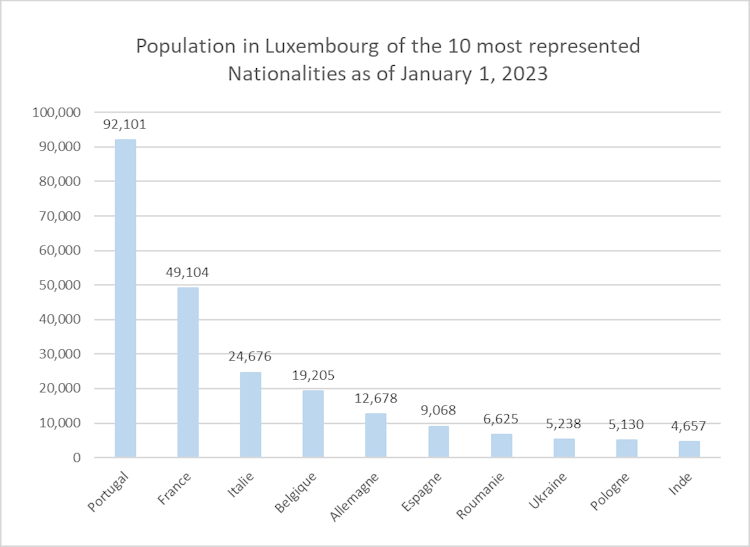
Luxembourg's population in 2025
With a population of 660,000, Luxembourg stands as the second least populous country in the European Union after Malta. However, what it lacks in numbers, it compensates for in remarkable diversity, with nearly half of Luxembourg population being foreign.
Renowned for its multiculturalism, Luxembourg not only boasts a population composed of almost half of the population being foreign-born but also maintains strong ties with neighboring countries. Evidenced by the substantial presence of cross-border workers, approximately 200,000 people commute daily to Luxembourg, contributing to its status as an exceptionally cosmopolitan nation.
The multinational population of Luxembourg
Despite being one of Europe's smallest and least populous countries, Luxembourg experiences robust annual population growth. The Grand Duchy's population is notably multicultural, with 347,402 Luxembourg nationals and 313,400 foreign nationals, constituting 47.4% of the total population, a unique scenario compared to many nations worldwide.
As of January 1, 2023, Luxembourg total population reached 660,809, a notable increase from the 339,841 inhabitants in 1970, nearly doubling the population over five decades.
This multicultural trend has evolved over time, in 1871, only 2.88% were foreigners, gradually rising to around 12% by the early 20th century. However, it wasn't until the aftermath of World War II that the foreign population saw a significant and sustained increase, reaching almost one-third of the country's population by the end of the century. Since then, foreign inhabitants have continued to grow, though at a slower pace.
The foreign population percentage continues to rise, contributing significantly to overall growth. In 2022, the total population increased by 15,412 individuals, with an astonishing 92.9% of demographic growth attributed to international migration. This consistent influx underscores Luxembourg's appeal on the global stage.
| Country | Population in January 2023 |
| Portugal | 92,101 |
| France | 49,104 |
| Italy | 24,676 |
| Belgium | 19,205 |
| Germany | 12,678 |
| Spain | 9,068 |
| Romania | 6,625 |
| Ukraine | 5,238 |
| Poland | 5,130 |
| India | 4,657 |
Portuguese in Luxembourg
Community page on facebook.com
One might assume that the largest foreign population in Luxembourg hails from its neighboring countries, France, Belgium, or Germany. Surprisingly, it's the Portuguese community that takes the lead, numbering 92,101 individuals in the Grand Duchy at the beginning of 2023.
Comprising 13.94% of Luxembourg's population, the Portuguese population in Luxembourg represents perhaps the highest proportion of Portuguese nationals relative to the native population worldwide. This significant presence traces back to a substantial wave of Portuguese immigration to Luxembourg.
Post-World War II, Portugal, ruled by an authoritarian regime led by Oliveira Salazar since 1932, witnessed a substantial portion of its population fall into poverty. In the 1950s, Luxembourg faced a labor shortage, prompting many Portuguese citizens to migrate to the Grand Duchy to escape dictatorship and insecurity. However, due to the absence of an agreement between the two countries, much of this migration was initially illegal.
This trend continued into the 1960s, with thousands of Portuguese seeking employment in prosperous Luxembourg to evade dictatorship and poverty. Before the Carnation Revolution in April 1974, under Marcelo Caetano's rule succeeding autocrat Salazar, Portugal actively organized emigration to relieve its economically strained situation. Luxembourg warmly welcomed these workers who played a crucial role in its economic development, particularly in the construction sector.
While Portuguese is not an official language, it stands as the second most spoken primary language after Luxembourgish, reflecting the enduring influence and integration of the Portuguese community in Luxembourg.
French in Luxembourg
Community pages on facebook.com and website francaisauluxembourg.fr
As of January 2023, Luxembourg was home to 49,104 French residents, comprising 7.43% of the population, an increase from their 2.5% share in 1970. Since the 2011 population census, the number of French nationals in Luxembourg has surged by 56.1%. Remarkably, the French community now stands as the second-largest foreign group in Luxembourg, a position they've held since 2001.
According to a 2018 study on French residents in Luxembourg, approximately 73.5% of them were born in France, while about 15% were born in the Grand Duchy. An interesting correlation exists between age and country of birth, with over 80% of French individuals aged 20 and above born in France. In contrast, those below the age of 20 increasingly have Luxembourg as their country of birth, with 80.1% of children aged 0 to 4 born in the Grand Duchy and only 15.2% in France.
French-speaking country
French is one of the most spoken languages in Luxembourg, serving as the primary language for around 83,802 people, constituting 14.9% of the population in Luxembourg. What other languages are spoken in Luxembourg — find out in our article.
Italians in Luxembourg
Community page on facebook.com
As of January 2023, Luxembourg counted 24,676 Italian residents, constituting 3.73% of the population, a decrease from their 6.9% share in 1970. After reaching a peak of 23,490 in 1970, the Italian population steadily declined until the 2010s. However, since then, there has been a resurgence, surpassing the 1970 peak in 2021.
Notably, Italians became the second-largest migrant group in 2022, with over 900 new arrivals, and since the 2011 population census, the number of Italian nationals in Luxembourg has surged by 36.6%. This reflects a renewed interest in Luxembourg among the Italian community.
Belgians in Luxembourg
Belgians constitute the fourth-largest foreign community in Luxembourg, following the Portuguese, French, and Italians. As of January 2023, there were 19,205 Belgians in Luxembourg, accounting for 2.91% of the population.
Since the 2011 population census, the number of Belgian nationals in Luxembourg has surged by 13.5%. The distribution of the Belgian population is not uniform across the country, with a notable concentration in border municipalities like Winseler, Weiswampach, and Ell.
Belgian passport or Luxembourgish?
An interesting aspect is the Belgians' inclination towards naturalization. Between 2010 and 2017, out of 27,642 individuals in Luxembourg who acquired Luxembourgish nationality, 2,018 were of Belgian origin, representing 7.3% of the total naturalizations during that period.
Germans in Luxembourg
Community page: facebook.com
German’s rank as the fifth-largest foreign community in Luxembourg, with 12,678 residents as of January 2023, constituting 1.92% of the population. While the absolute number of Germans has seen a gradual increase since the 1970 census, their percentage of the total population has remained relatively stable since 1947. Since the 2011 census, the German population in Luxembourg has grown by 5.2%.
The German language, alongside French, is one of the national languages, significantly influencing many aspects of daily life. Approximately 16,412 people speak German as their primary language, representing 2.9% of the Luxembourg population.
An intriguing demographic aspect is the age distribution among Germans, differing significantly from the overall population. Germans are underrepresented among children and young adults compared to the general population, while those aged 30 and above are overrepresented. Germans are more likely to have reached retirement age compared to the overall population.
Other communities in Luxembourg
Beyond the prominently represented communities, it is interesting to further explore the details of other, less visible communities. While they may not be as numerous, these communities wield a significant impact on Luxembourg's multicultural fabric, enriching the national culture with their presence and traditions.
Muslims in Luxembourg

A key gathering place for the community. Operated on a voluntary basis, LJM pursues numerous objectives, aligning with both Islamic principles and Luxembourg's legislation. Beyond addressing the various needs of Muslims, it also strives to educate the Luxembourgish public about Islam and its culture.
In recent years, the Muslim population in Luxembourg has seen a notable increase, estimated to be around 40,000 individuals, constituting approximately 6% of the country's total population. This figure has more than doubled in the past decade, compared to 12,000 to 15,000 Muslims in Luxembourg 10 to 15 years ago.
However, these numbers are approximations, as the study of Islam in Luxembourg remains relatively limited and understudied. Since 1970, the last census that mentioned religious affiliation, it has been legally prohibited, under the March 31, 1979 law, to collect data on religious affiliation through a census. As a result, estimates regarding the number of Muslims in Luxembourg are based on people's national origin, which is not a precise indicator of religious affiliation.
Despite the challenges in studying this community, it is known that over half of Luxembourg's Muslim community comprises individuals of Bosnian, Kosovar, or Albanian origin. They are followed by Maghrebis (Moroccans, Tunisians, Algerians) and Syrians.
Jewish in Luxembourg

Following World War II, a new consistory was established in Luxembourg, still serving as the headquarters of the Jewish community in the country
The history of Jews in the Grand Duchy of Luxembourg dates back to 1276, marked by the first documented mention of Jews in the city of Luxembourg. In the early 19th century, the country welcomed around fifteen Jewish families, a number that rapidly increased but remained relatively small. By 1808, 75 Jews were recorded, growing to over 150 families in the Gutland region by 1880.
At its peak in the 1930s, more than 4,000 Jews lived in Luxembourg, largely due to recent immigration from Eastern Europe. However, during the Second World War, the Jewish community suffered deportation and extermination, significantly diminishing its numbers.
Throughout the latter half of the 20th century, the Jewish population did not experience significant growth. Today, approximately 700 Jews, comprising around 300 to 350 families, including diplomats and expatriates, reside in Luxembourg. This community, concentrated mostly in Luxembourg City with a smaller presence in Esch-sur-Alzette, constitutes one of the country's significant ethnic minorities.
Latin Americans in Luxembourg
The Latin American community in Luxembourg, while relatively small, comprised 4,432 individuals of Latin American origin as of January 1, 2023, representing 0.69% of the Luxembourg population. Among them, 3,050 individuals are of Brazilian origin, forming a significant majority, while the remaining 1,382 come from Spanish-speaking countries.
Despite being less prominent than other communities, the Latin American community is well-integrated into society, with various meeting places such as Mexican restaurants like Agave and the Argentinean spot, Cafetin de Buenos Aires. Additionally, numerous bars provide spaces to enjoy salsa and other Latin rhythms, contributing to the vibrant cultural tapestry of Luxembourg.
Read article

Here you can find this community online
Eastern Europeans in Luxembourg
While Eastern Europeans are not as prominently represented in Luxembourg as other nationalities, recent geopolitical shifts have brought about a notable change.



Here you can find these communities online
- Ukraine: facebook.com
- Russia: facebook.com
- Poland: facebook.com
- Romania: facebook.com
Frequently Asked Questions (FAQ)
What is the total population of Luxembourg?
Which nationality constitutes the largest foreign community in Luxembourg?
How has the percentage of foreigners in Luxembourg evolved since the 1970s?
Source: luxembourg.public.lu, alphatrad.fr, statistiques.public.lu, statistiques.public.lu, statistiques.public.lu, statistiques.public.lu, bladi.net, forum.lu, ljm.lu, fr.wikipedia.org, worldjewishcongress.org
We took photos from these sources: Tao Qi on Unsplash, Hannah Busing on Unsplash, Le Juste Milieu Facebook Page, Jewish Consistory of Luxembourg


